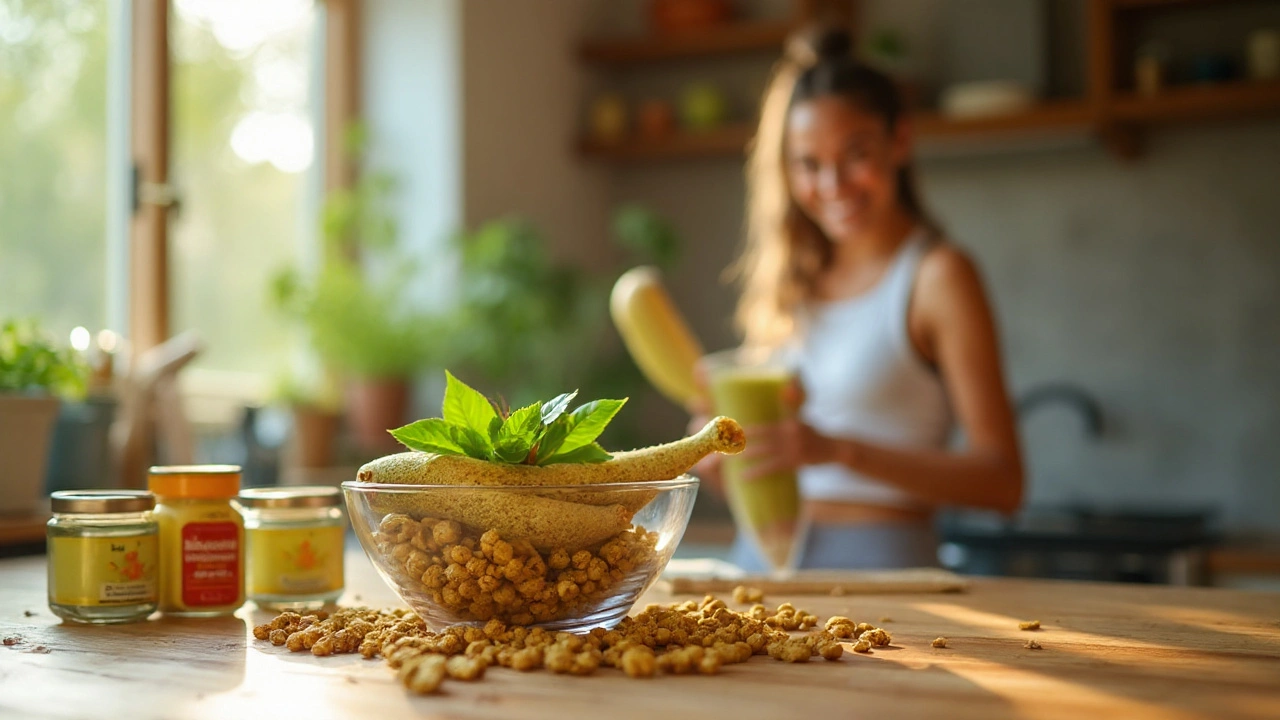If someone offered you a plant leaf that’s been relieving coughs and allergies since the days of ancient India, you might roll your eyes—until you learn that modern science actually backs some of the legends. Malabar Nut is having a moment, and it’s not just buzz in Ayurvedic clinics. From TikTok wellness dieters to pharmacists in downtown Durban, folks are adding this leafy superfood to daily routines for better breathing, immunity, and gut health.
What Is Malabar Nut and Why Are People Raving About It?
So, what’s hidden in this unassuming leafy shrub? The botanical name is Justicia adhatoda, but if you grew up in southern Africa or India, you likely know it by “Adhatoda” or “Vasaka.” It grows like a weed in warm, semi-tropical areas—exactly the kind of green you’ll spot along KZN’s coastal gardens. But for centuries, it’s been way more than backyard scenery. Traditional healers have brewed Malabar Nut leaves into teas or decoctions to clear out phlegm, calm wheezing, or even soothe a sore throat.
But now, this plant is crossing over from old-wives’ medicine to pharmacy shelves and supplement aisles. Why? For starters, Malabar Nut packs alkaloids called vasicine and vasicinone—compounds that researchers have linked to bronchodilator and expectorant actions. Translation: it helps widen your airways and thin out mucus, which makes life way easier for anyone with a tickly, stubborn cough. It isn’t all “old wisdom” either. One 2023 review in the Journal of Ethnopharmacology laid out how Malabar Nut extracts actually affect inflammation, allergies, and even antioxidant levels in controlled settings.
And let’s talk myth-busting. This is no magic fix or quick cure for disease, but it fits neatly into a daily self-care routine. People with mild allergies, seasonal sniffles, or the legendary Durban sinus issues are swearing by Malabar Nut supplements. It hasn’t replaced inhalers or allopathic meds, but it’s a backup for those seeking plant-based support—especially in a city famous for pollen, dust, and fireworks after every Sharks rugby win.
Want a bit of trivia? In ancient scripts, Sanskrit texts described vasaka as “Shwasahara”—the destroyer of breathlessness. Is it any wonder modern wellness trends keep coming back to these old-world secrets?
Let’s Break Down the Science: Real Benefits of Malabar Nut
No one should swallow any herb just because Instagram says it’s cool. You need proof. Here’s what’s actually shown up in trustworthy studies and actual clinical trials about Malabar Nut and its main compounds:
- Respiratory Relief: Vasicine, the hero compound in Malabar Nut, has a bronchodilator effect similar, but not equal, to some common asthma medications. In several animal studies cited by the Indian Council of Medical Research in 2024, vasicine reduced bronchial smooth muscle spasms and improved mucus clearance. Some small human trials even found it reduced coughing fits in folks with chronic bronchitis.
- Anti-Inflammatory Powerhouse: This plant shows promise not just for lungs but for joints and inflammation hotspots, too. Phytochemical screens show that Malabar Nut extracts lower common markers like TNF-alpha and interleukins. It’s not going to replace your painkillers, but people with mild aches (or that usual post-gym soreness) might notice subtle benefits.
- Antioxidant Shield: Malabar Nut is loaded with vitamins C, E, and beta-carotene—antioxidants that mop up free radicals linked to aging and disease. A 2023 University of Cape Town lab study showed its extract could cut oxidative stress by nearly 30% in cultured cells.
- Immunity and Gut Support: Traditional medicine said it “cools” and soothes the gut. It won’t fix every tummy ache, but a regular supplement may help calm mild indigestion, especially after one too many spicy Durban curries.
How does this compare to more famous superfoods? Take a look:
| Superfood | Main Benefit | Common Compounds | Cultural Background |
|---|---|---|---|
| Malabar Nut | Lung & Immunity Support | Vasicine, Flavonoids | Indian & African healing |
| Turmeric | Anti-Inflammatory | Curcumin | Ayurveda & Asian |
| Moringa | Antioxidant & Energy | Vitamins A, C | African |
So yes, the malabar nut stands shoulder to shoulder with the best of natural superfoods—without the wild price tag or eco guilt.

How To Use Malabar Nut Supplements Safely
Not every supplement is made equal, and context matters. If you pop into a health shop on Florida Road, you’ll find Malabar Nut as powder capsules, herbal teas, and even tinctures. The most traditional way is brewing dried leaves with ginger and honey (that’s how my mother-in-law, bless her, still does it when Margot gets the sniffles).
- Dosage: Most over-the-counter brands sell it in 250mg to 500mg convenient capsules. Typical advice: one capsule twice daily, but always go with what the packaging says or, even smarter, ask your health professional.
- Tea or Decoctions: If you fancy brewing, steep about a teaspoon of dried leaves in hot (not boiling) water for 10 minutes. Add a squeeze of lemon or a dash of honey.
- Watch Your Source: Make sure the supplement is clean, ideally certified organic, and not full of fillers or unknown additives.
- Check for Interactions: It’s safe for most, but if you’re on heavy meds for asthma, heart issues, or blood thinners, have a quick chat with your pharmacist.
- Not for everyone: Pregnant or breastfeeding? Give it a skip or ask first; safety research is thin here.
Pro tip: Many folks start with half the suggested dose for a few days, especially if they’ve never tried leafy herbal supplements before. Listen to your body, and if anything feels weird (allergic rash, gut upset), stop right there. You can always try again later or switch forms—some digestive systems are friendlier to teas than capsules.
Tips for Making Malabar Nut Part of Your Routine
So you’re sold on trying out this plant, but the real magic is when you can stick with it. Here are a few ways people I know make Malabar Nut part of everyday health:
- Toss a capsule in with your morning multivitamin—super easy and takes seconds.
- Herbal teas are nice after heavy meals or in the evening, especially if you’re prone to heartburn. Pair with mint or ginger for added digestive help.
- Create your mini ‘immune season’ blend: mix Malabar Nut powder with a little turmeric and black pepper, add to smoothies or yogurt.
- If season changes knock you down every year (hello, spring allergies), try adding a short course (three to six weeks) of Malabar Nut supplement preemptively. Track symptoms in a simple diary or app.
- Athletes: some Durban surfers say it helps clear saltwater-induced sinus congestion—might be worth trying, but start small before paddling out.
Consistency is key. Whether you use capsules, powders, or teas, benefits build up over time. Nothing flashy, just a little support every day, like how you remember to charge your phone or pack a jersey because the weather shifts in five minutes.

The Bottom Line: Is Malabar Nut the Superfood for You?
Ancient remedies sometimes get hyped beyond reality, and Malabar Nut is no miracle fix. But the science and the stories line up—this plant is packed with real, measurable benefits. Maybe you’re fighting off city allergies, waking up with a runny nose, or just want something natural to build into your self-care routine. Malabar Nut’s gentle support for breathing, allergies, and immunity is worth checking out. The key is sticking with high-quality versions and making it part of your bigger health plan. I never recommend ditching prescribed meds, but when Margot and I brew Malabar Nut tea after one of Durban’s wicked pollen storms, we notice the difference. If you’re curious and ready for something that’s stood the test of actual generations, this green leaf delivers more than most so-called superfoods.





Anthony Breakspear
August 15, 2025 AT 13:37Man, I tried this stuff after my last cold went on for three weeks-turned into a human fog machine. One capsule a day for five days and suddenly I could breathe through my nose again? Wild. Not a miracle, but definitely a quiet win. No more midnight coughing fits where I swear the dog started side-eyeing me.
Saurabh Tiwari
August 17, 2025 AT 13:14Adhatoda is everywhere in south India, we call it vasaka. Grandma used to boil the leaves with black pepper and honey for my coughs. No pills, no fuss. Just warmth and earth. Funny how the West turns it into capsules now. Still works the same way. 🌿
Sandi Allen
August 17, 2025 AT 17:07ALERT: Big Pharma is quietly funding these 'natural remedy' TikTok trends to distract you from the fact that they're selling you synthetic bronchodilators at 10x the price! This plant has been suppressed for decades because it's TOO effective! They don't want you breathing easy without a prescription!!
Allan maniero
August 18, 2025 AT 14:10I’ve been taking this for about two months now-mostly because I live in London and the air quality here is basically a slow-motion asthma attack. I don’t know if it’s placebo, but I’ve noticed I’m not coughing as much after runs, and my sinuses feel less clogged in the mornings. Not a game-changer, but it’s one of those little things that adds up. I like that it’s not some overhyped mushroom or cactus juice. Just a leaf. Simple. Honest.
Saravanan Sathyanandha
August 19, 2025 AT 20:32As someone raised in Kerala, I’ve seen vasaka used in homes for generations. The real power isn’t just in the alkaloids-it’s in the ritual. Brewing it with ginger, letting the steam rise, inhaling before sipping. That’s the medicine too. Modern science just gives names to what our grandmothers already knew. Respect the tradition, don’t just commodify it.
Michael Campbell
August 21, 2025 AT 18:49Why are we still talking about this? America’s got real medicine. Why are we chasing leaves like it’s 1700?
Victoria Graci
August 23, 2025 AT 16:37It’s fascinating how plants like this carry not just chemistry but cultural memory. Vasaka isn’t just a compound-it’s a lineage. The Sanskrit term ‘Shwasahara’-destroyer of breathlessness-isn’t poetic fluff. It’s a direct observation, refined over centuries. Modern pharmacology just caught up. We’re not discovering ancient wisdom-we’re rediscovering it, and often, poorly.
Eddy Kimani
August 25, 2025 AT 04:18From a bioactive compound standpoint, vasicine’s bronchodilatory mechanism via calcium channel modulation is pretty well-documented. But what’s underreported is the bioavailability variance across extraction methods. Most commercial capsules use ethanol extracts-high yield but potentially degrading flavonoid synergists. Water-based decoctions may be more physiologically relevant for mucosal delivery. Just sayin’.
Elizabeth Farrell
August 25, 2025 AT 16:19I started taking this after my chronic sinus issues flared up last winter. I didn’t expect much-but after three weeks of daily tea, I actually slept through the night for the first time in years. Not a cure, but a quiet ally. I think we underestimate how much small, consistent care can shift things. No hype. Just patience. And maybe a little honey.
Fern Marder
August 26, 2025 AT 09:21Look, I’m not saying this is magic, but I tried it after reading this post and now I’m basically a wellness influencer. I even made a Reel. #MalabarNutMagic #BreathFree #PlantPower 🌿✨
Paul Santos
August 28, 2025 AT 01:18Interesting, though I’d argue the epistemological framework of ethnopharmacology is inherently reductionist when it isolates vasicine from its ecological and cultural matrix. The plant doesn’t exist in a vacuum-it’s entangled with monsoons, agrarian rhythms, and oral traditions. To treat it as a supplement is to perform cultural neocolonialism with a side of probiotics.
Kristen Yates
August 28, 2025 AT 05:56I’ve used this for years. Not because it’s trendy. Just because it works. No need to overthink it.
Girish Padia
August 28, 2025 AT 08:05People think this is new but in India we never stopped using it. Now everyone wants to sell it and make money. Sad. The real power was never in the bottle.
John Webber
August 29, 2025 AT 20:45wait so this is like... a leaf? you just eat a leaf? why are you all so excited? i mean i get it but also i dont. also i think the spelling is wrong. its malabar nut not malabar nut. just saying.
Chelsea Moore
August 29, 2025 AT 23:38THIS IS A SCAM. I read this and then my neighbor started using it and now she’s claiming she can ‘feel the earth’s energy’ through her lungs. She’s posting yoga poses with the supplement bottle. I’m scared. This is how cults start. Someone’s gonna get hurt.
John Biesecker
August 31, 2025 AT 11:50my cousin in hyderabad swears by vasaka tea. said it helped his asthma way better than the inhaler. i tried it last winter-kinda bitter, but i liked the smell. now i drink it with chai. weird combo, but it works. 🌿☕
william tao
August 31, 2025 AT 22:32While the empirical data presented is superficially compelling, one must interrogate the methodological rigor of the cited ethnopharmacological studies, particularly those originating from non-blinded, non-randomized, low-sample-size trials conducted in regions with limited regulatory oversight. The purported antioxidant effects, for instance, derive from in vitro cell line assays-translational relevance remains unproven in vivo. Furthermore, the absence of long-term safety profiles in human populations renders this an unwise addition to daily regimens. I recommend consulting peer-reviewed meta-analyses before embracing botanical novelties masquerading as science.
Victoria Graci
September 1, 2025 AT 11:10It’s funny how we treat ancient remedies like they’re either magic or nonsense. But what if they’re just… quiet? Like the way a well-tuned violin doesn’t shout-it resonates. Malabar Nut doesn’t promise to fix everything. It just helps you breathe easier. Maybe that’s the real rebellion: choosing slow, simple support over loud, flashy fixes.